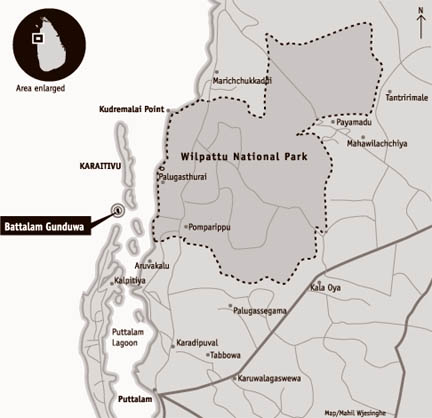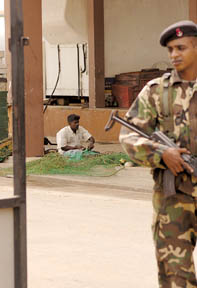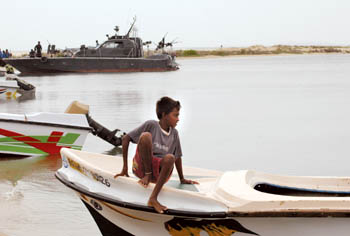|
observer |
|
|
|
|
|
OTHER LINKS |

|

|

|
|
Kalpitiya: Fishing in troubled waters
Maria Claude, a woman in her thirties looks much older having toiled most of her life in this fishing island, forty km off the coast of Kalpitiya. Apart from its fishing resources, the adjacent sea made headlines in the recent past for the increase in sea Tiger activities. Until late last month, the danger was distant. But, two weeks ago, the sea Tigers came closer and as the Navy and sea Tigers exchanged gunfire, hapless fishermen ran for safety. Maria like most other fishermen and women represent a distinct racial mixture. She is a Sinhalese, but speaks Tamil most of the time and when she speaks in Sinhala, it was in an accent that sounded different. In her childhood, she studied in a Tamil medium school. In her youth, she along with her friends, used to visit the nearby Pukkulama inhabited by Tamils, a few sea miles from Battalangunduwa in the direction of Mannar. But, that link was severed in the early 1990s when the Tamil Tigers hinted further visits would not be welcomed. Two weeks ago, the Tigers came closer to the fishing island and disguised as fisherman, attacked a Navy boat on a routine sea patrol.
The boat, a Inshore Patrol Craft popularly known as a water jet was set ablaze by Rocket Propel Grenade(RPG) fire. The boat sank. Five sailors perished. It was the first time, the war came that close to Maria's life. As the fire fight dominated the sea, at least three LTTE boats tried to move towards Battalangunduwa island. A Navy gun boat stationed near the island exchanged fire with the sea Tiger boats. "We ran for shelter. It was almost like getting caught at the centre of the battle," said Maria's friend Sri Pushpa (35) "It was frightening ... of course, It was sad to see a Navy craft burning." The sea Tigers could not succeed and were driven back by the navy gunboat. But, horrors of the sea clash still reverberates in the fishing island. Now most fishing families move to a church in a nearby island to spend the night. Despite the horror of the incident, fishermen have a greater bond with the island. This island and adjacent sea is their lifeline and livelihood, which they would not give up at any cost. Sandhya Kumar proclaims that he would not leave the island, rather fight till death. This kind of rhetoric stem through anger at the growing sea Tiger threat.
Last week most papers flashed headlines that fishermen were fleeing Battalangunduwa after the sea clash. But, the people left in the island say their fellowmen and women went for a festival in a Catholic Church in Kudapaluwa, some fifty km from Kalpitiya on the Puttalam- Colombo road. The annual festival of St Anne's Church, Kudapaluwa was held last week. Only a few dozen of families out of over three thousand mostly Roman Catholic inhabitants were left in the Battalangunduwa island last week. And most of the inhabitants in the island are also the migrant fishermen coming from the North Western coastal belt, especially from Negombo. Life in this fishing island is harsh. But, adjacent seas are a trove of fishing resources. Boats from the main land arrive every morning to take the daily catch. Some fishermen sail the extra forty km carrying their harvest to the Kalpitiya jetty where there is a brisk business. However the boats had not arrived in Battalangunduwa for the four days since the sea clash. At last, a boat came on Saturday and bought the catch of the fishermen at a cheaper rate. Drinking water is a luxury in the island. Local women dig a foot deep hole in the sand. The fresh water gushes from the newly dug hole. The women would fill their buckets in a hurry. As they empty the hole, comes salty water. Women would fill the hole and dig a new one. Life in this island is monotonous. But there is always a colour in it. At the sunset, children play on the beach. Maria fondles her youngest, a smiling toddler on a makeshift cradle hanging from the roof of a fishing hut. From the distance a reddish sun is gradually swallowed by the sea. Why Tigers want fishermen out from Battalangunduwa?Battalangunduwa island approximately 18 nautical miles off Kalpitiya is mainly inhabited by migrant fishermen. Intentionally or not, they act as a human barrier to the sea Tiger movements from Mannar to the South - It was the fishing folk in Pamunugama who tipped off to arrest four sea Tigers off Pamunugama. Fishermen in Battalangunduwa know the adjacent sea like the lines of their palm. A close knit community, they could easily identify any boat not belonging to the local fishermen. And their rapport with the Navy is exceptional. They remain a formidable barrier to the LTTE attempts to smuggle arms to Colombo. Increasing LTTE activities have been monitored in Kudiramalai Point, which is closer to the Battalangunduwa island. Two weeks ago, the sea Tigers seized seven fishermen and four boats and took them to the coast. Having ordered fishermen to stay in the beach, guarded by armed cadres, the rest of the group sailed in the four boats seized by the fishermen. Disguised as fishermen, the sea Tigers attacked a Navy gun boat. Five sailors were killed in the attack. "The sea Tigers could approach the IPC because the sailors aboard thought they were fisherman," says Lt Commander Jagath Premaratne, the acting commanding officer of the Kalpitiya Navy base. Having come close, they fired a Rocket Propeled Grenade at the gunboat, setting it ablaze. Lt Commander Premaratne however says the danger is remote and the Navy was prepared to take on any threat on the lives of the fisherman. As it transpired in discussions with fishermen, most of them seem to believe him too. |
 Sunday Observer staffer
Ranga Jayasuriya visits Battalangunduwa
fishing islands off Kalpitiya, a week after a fierce sea clash off the
island...the first time the war came that close to the island life.
Sunday Observer staffer
Ranga Jayasuriya visits Battalangunduwa
fishing islands off Kalpitiya, a week after a fierce sea clash off the
island...the first time the war came that close to the island life. 








